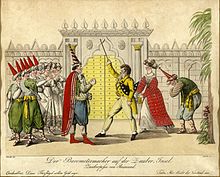Friedrich Josef Korntheuer
Friedrich Josef Korntheuer (born February 15, 1779 in Vienna ; † June 28, 1829 there ) was an Austrian actor and playwright.
Life
At the request of his parents, Korntheuer began a civil servant career, but then, following his inclination, chose the stage career. From 1803 to 1804 he was engaged as a comedian in Klagenfurt and from there moved to the Vienna Burgtheater , where he worked until 1808. Then he came to Emanuel Schikaneder , who was then working in Brno , as a director . From 1811 to 1813 he played again at the Burgtheater and the Theater an der Wien . From 1813 to 1815 he was appointed director of the Estates Theater in Brno, then guest performances in Pest , Stuttgart , Graz and Pressburg followed . From 1821 to 1825 he played at the Leopoldstädter Theater , where Ferdinand Raimund wrote the role of "Longimanus" for him in Der Diamant des Geisterkönig . Korntheuer embodied the "old age" in 1826 in Der Bauer as a millionaire by the same author. Other main roles were the "Tutu" in Raimund's The Barometer Maker on the Magic Island , the "Fabian" in Die Ballnacht by Johann Karl Waldon, as well as the "Wachtmeister Werner" in Gotthold Ephraim Lessing's Minna von Barnhelm , and many others.
As a playwright he wrote a few plays, for example The New Year (1816), The Comedy in the Room (1822), All Are Married (1825), Amorosa (1826). His play All Are In Love (1823) was revised by David Kalisch in 1858 under the title An educated house servant and in the same year by Johann Nestroy with the same title.
Korntheuer enjoyed great popularity with the audience, which he entertained with his extempores as a performer of martial hero roles as well as as a comic slipper hero. With his extraordinary body length, his phlegm and his quick-wittedness, he became just as prominent a popular actor as his colleagues Raimund, Ignaz Schuster and Therese Krones . Adolf Bäuerle , the publisher of the Wiener Theaterzeitung , gave him the honorable nickname “ Proteus of the Volksbühne, Devrient of the local theater, agent of all cheerful characters” because of his versatility .
Ignaz Franz Castelli dedicated a detailed and very laudatory obituary with some stage anecdotes to Korntheuer in his memoir From the Life of a Viennese Phäaken 1781–1862 . He said that Korntheuer, in a role as mayor, replied offhand to the announcement that a famous actress who had just arrived had also been sprinkled with lettuce leaves for lack of flowers:
- "Right, Sperling, and let me boil twelve extra hard eggs and put them on the salad."
Friedrich Josef Korntheuer was dismissed as a member of the Leopoldstädter Theater at the end of 1828 due to illness and died a few months later in June 1829 at the age of only 50 of his serious illness.
Honors
The Korntheuergasse in Vienna- Döbling is named after Friedrich Josef Korntheuer.
literature
- Constantin von Wurzbach : Korntheuer, Friedrich Joseph . In: Biographisches Lexikon des Kaiserthums Oesterreich . 12th part. Kaiserlich-Königliche Hof- und Staatsdruckerei, Vienna 1864, pp. 467–469 ( digitized version ).
- Joseph Kürschner : Korntheuer, Friedrich Joseph . In: Allgemeine Deutsche Biographie (ADB). Volume 16, Duncker & Humblot, Leipzig 1882, p. 722.
- Elisabeth Pablé : Korntheuer Friedrich Josef. In: Austrian Biographical Lexicon 1815–1950 (ÖBL). Volume 4, Verlag der Österreichischen Akademie der Wissenschaften, Vienna 1969, p. 134 f. (Direct links on p. 134 , p. 135 ).
- Rolf Badenhausen : Korntheuer, Friedrich Joseph. In: New German Biography (NDB). Volume 12, Duncker & Humblot, Berlin 1980, ISBN 3-428-00193-1 , p. 597 ( digitized version ).
Individual evidence
- ↑ Constantin von Wurzbach: Biographisches Lexikon des Kaiserthums Oesterreich , p. 469.
| personal data | |
|---|---|
| SURNAME | Korntheuer, Friedrich Josef |
| BRIEF DESCRIPTION | Austrian actor and playwright |
| DATE OF BIRTH | February 15, 1779 |
| PLACE OF BIRTH | Vienna |
| DATE OF DEATH | June 28, 1829 |
| Place of death | Vienna |
